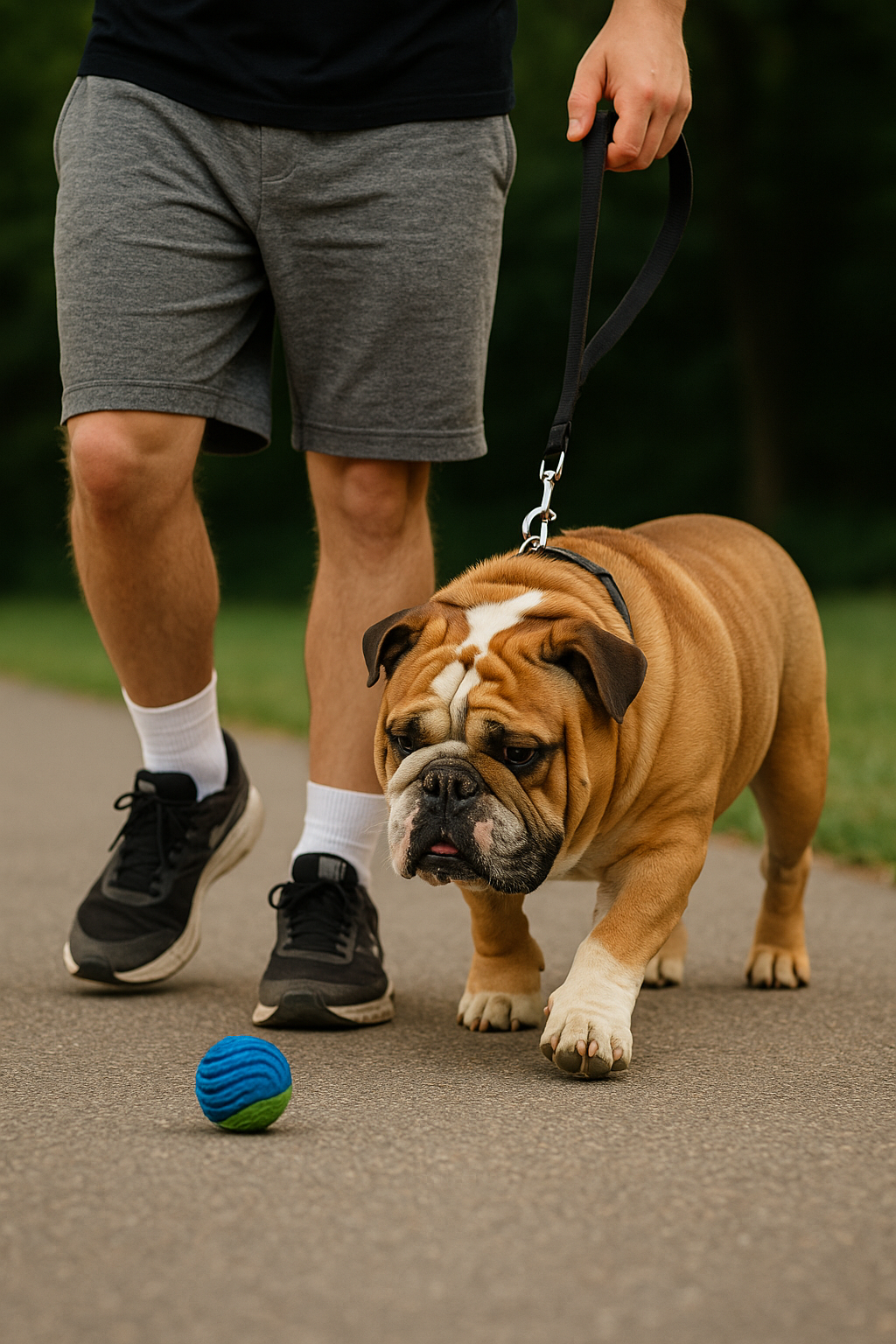The Bulldog is a charming, affectionate, and very popular breed, but it’s also especially prone to being overweight. Their sturdy body structure, natural tendency toward a sedentary lifestyle, and love for food make weight gain a constant risk if preventive measures aren’t taken. In this article, you’ll learn why maintaining your Bulldog at a healthy weight is so important, what factors contribute to obesity, and what you can do daily to prevent it.
Why Is Obesity So Common in Bulldogs?
Obesity in Bulldogs is not just an aesthetic issue—it can lead to serious health problems, such as:
- Breathing difficulties (especially due to their brachycephalic condition)
- Joint and mobility problems
- Heart disease
- Diabetes
- Increased surgical risk
- Reduced quality and life expectancy
Main causes of obesity in this breed include:
- Lack of physical exercise
- Inadequate or excessive feeding
- Too many treats or table scraps
- Sterilization without adjusting the diet afterward
- Hormonal issues (like hypothyroidism)
How to Know If Your Bulldog Is Overweight
Bulldogs are naturally broad and muscular, which makes it easy to overlook excess weight. However, some signs can help you identify it:
- You can’t easily feel their ribs
- Their waist is barely visible from above
- They have trouble breathing even while resting
- They tire quickly during walks
- They avoid playing or moving
- They snore more than usual
- Their skin folds look bulkier due to fat
If you’re unsure, consult your veterinarian for a full assessment, including current weight, body condition score, and potential medical causes.
Nutrition: The Foundation of a Healthy Weight
Controlling what your Bulldog eats is the first step to preventing obesity. Here are some key tips:
1. Choose Quality Food
Opt for high-quality kibble made specifically for medium breeds or for dogs prone to weight gain. These foods offer a proper balance of protein, fat, and carbs, plus fiber to support satiety.
Avoid generic or low-cost foods with high levels of flour, corn, and unspecified meat by-products.
2. Measure Portions Carefully
Don’t guess or leave the bowl full all day. Use a measuring cup and follow the manufacturer’s recommendations based on your Bulldog’s ideal weight—not current weight if overweight. Divide the daily ration into two meals: one in the morning, one in the evening.
3. Limit Treats
Treats are useful for training, but overuse adds lots of empty calories. Use low-fat treats or substitute them with safe fruits like apple slices or carrot sticks. Avoid table scraps, which are usually salty, greasy, and heavily seasoned.
4. Don’t Give In to the Puppy Eyes
Bulldogs are experts at begging with their irresistible expressions, but you must stay firm. Giving food every time they ask reinforces bad habits and promotes weight gain. Instead, distract them with petting, a toy, or a short indoor walk.
Adapted Physical Activity
While Bulldogs aren’t hyperactive, they do need daily movement to stay in shape and healthy.
1. Regular Walks
Two daily walks of 15 to 30 minutes are enough. Avoid walking during hot hours, as Bulldogs are sensitive to heat. Walk at a slow, steady pace, allowing your Bulldog to sniff and explore.
2. Indoor Play
If outdoor walks aren’t possible, use indoor space to keep them active. Try fetch, treat-dispensing toys, or hide treats around the house to encourage movement.
3. Balance Is Key
Don’t push your Bulldog too hard, as intense activity can cause breathing issues. But don’t let them stay inactive all day either. Pay attention to their behavior—if they pant excessively or lie down often, let them rest more frequently.
Track Weight and Physical Condition
Monitoring your Bulldog’s weight monthly helps you catch problems early. Weigh them at home with a suitable scale, or take them to the vet regularly.
Besides weight, observe:
- Muscle tone
- Body shape from above and from the side
- Overall behavior (energy, mobility, breathing)
Also, schedule annual vet checkups to rule out underlying medical conditions that may affect weight, such as hormonal imbalances.
Post-Neutering Adjustments
Many Bulldogs gain weight after being spayed or neutered due to a metabolic shift. This doesn’t mean weight gain is inevitable—you just need to adjust their diet accordingly. Ask your vet about lower-calorie food options for sterilized dogs that still provide complete nutrition.
Involve the Whole Family
To prevent obesity, everyone in the household must follow the same rules. If you manage their diet but someone else sneaks them treats or table food, the effort will be wasted. Establish shared guidelines and communicate the importance of keeping your Bulldog healthy.
A Healthy Bulldog Is a Happy Bulldog
Preventing obesity not only helps your Bulldog live longer, but also improves their quality of life at every stage. A healthy-weight dog breathes better, moves more easily, sleeps well, and has a better overall mood.
With a little daily attention, a proper diet, physical activity, and lots of love, your Bulldog can stay in great shape without sacrificing their well-being—or their adorable personality.
